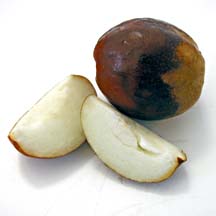
Eleanor Nakama-Mitsunaga
![]()

|
Mention jujubes, and those fruit-flavored, chewy, gelatinlike candies that stick to your teeth come to mind. But the real jujube is an actual fruit. Its juice was originally used to flavor the candy, and the name stuck.The basics: Jujube, also known as Chinese red date, is the fruit of a small, ornamental tree that has been cultivated in China for more than 4,000 years. The fruit was traditionally cherished for its medicinal qualities and was believed to be very nutritious.
Many varieties of jujube trees produce an array of fruit from cherry-size to plum-size, from elongated to round. The immature fruit is greenish-yellow and turns reddish-brown as it matures. Fresh jujube is enjoyed when the fruit is a mixture of red and green hues.
Jujube has a hard pit with a crispy flesh similar to apples. The taste resembles a fuyu persimmon. As the fruit matures, the skin wrinkles and the flesh becomes softer, taking on a concentrated flavor resembling a date. These mature jujube are most often dried to be eaten as a snack or used in candies, cakes and teas. We most often see it decorating the center of a wheel of gau (Chinese New Year mochi) surrounded by sesame seeds.
Selecting: Fresh jujube isn't the most pleasing fruit to look at. At first glance it may resemble a green and red crab apple. It is often sold in a bunch in bags or a plastic container. Make sure the fruit is firm. Reddish-brown spots are normal, but the fruit should not have soft spots.
Storing: Fresh jujube should last for a week or so in the refrigerator.
Use: Fresh jujube is generally eaten as is. The thin skin is edible but may be peeled off. It is also cooked down, stewed in sugar water or stir-fried to give vegetables a unique flavor.
Dried jujube is most often enjoyed as a snack or made into candy. The dried fruit is steamed or boiled in sugar water or rice wine vinegar. Then it is covered with a sticky sugar and honey syrup. A Korean dish uses dried jujube to flavor rice porridge.
Where to buy: Fresh jujube is currently in season, but the supply is very limited. Your best bet is Marukai or other Asian markets. Prices range from $3 to $4 a pound. Dried jujube is readily available in Asian markets and Chinatown.
Palama Market on Dillingham Boulevard carries a large supply of Korean dried jujube that ranges in price from $3 to $5 a bag, depending on quantity.
Eleanor Nakama-Mitsunaga is
a free-lance food writer. Contact her
online through features@starbulletin.com

